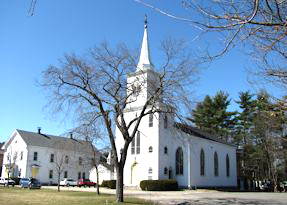Pastoral Prophetic Care Corner
By Rev. Michelle Walsh, November 29, 2024
November was an exceptional month for First Parish within the broader Canton community in giving public witness to our UU values and principles. As both Don Seaman and Diana Levy note in their reports elsewhere, we have consistently engaged with the broader town of Canton through our public speaker series as well as our ongoing partnership with the Canton Diversity, Equity, and Inclusion Committee. This included a deeply moving and inspiring Transgender Day of Remembrance event held during the Transgender Awareness Week, supported also by my Canton interfaith clergy colleagues Rabbi Andrea M. Gouze (Temple Beth David), Rabbi Lisa Feld (B’nai Tikvah), and Rev. Rachel Wildman (Trinity Episcopal Church).
A capstone for November, as referenced by Jim Chubet in his Music Notes, was a spectacularly successful Interfaith Thanksgiving Service, also recorded by Canton Cable (watch for it to be posted sometime here: https://reflect-cctv-vod.cablecast.tv/CablecastPublicSite/gallery/8?site=6). We are grateful to all the faith groups and clergy that participated in making this such a successful event, including the clergy above (Rabbi Gouze gave the message) along with Reverend Thomas S. Rafferty (St. Oscar Romero Parish) and Reverend Dr. John Tamilio III (Congregational Church of Canton). The interfaith choir, under Jim’s direction with FPUU choir members and supported also by Rabbi Feld, was truly remarkable as well! Thank you, Jim and FPUU choir in particular! A special shout out of thanks also to all who worked diligently behind the scenes from FPUU to prepare for and clean up after the event – including Don S. and Debbie R. on removal of pews and work on the audio system, Carol Smith on the order of service, Terry P. and Felisa W. in ushering, and Kitty M. for the reception afterwards. FPUU really showed up and shined!
All this said, we have moved through a very challenging election and are entering a period of time when many people have deep fears and anxieties for the impact of potential policies on those who are most marginalized in our society, policies that are counter to our UU faith values and principles. We do need to take stock of how we care for one another and our families first and foremost so that we can become healthy sanctuaries for those who may need us the most in these coming times. In all of this, I take deep refuge in my Buddhist spiritual practices as a UU clergyperson for sustenance. A spiritual practice is not just something we turn to in times of crisis, it is meant to be a habit during good times and challenging times so that we can turn to it like an old comfortable friend. Two practices within Buddhism have been present with me more and more these days, and I offer them here for your own meditation.
The first is a Buddhist parable lifted up by the late Buddhist practitioner, Alan Watts, called “The Maybe Story” or “The Chinese Farmer Story.” It goes like this (taken from a longer article https://matterco.co/the-maybe-story/):
“Once upon a time there was a Chinese farmer whose horse ran away. That evening, all of his neighbors came around to commiserate. They said, “We are so sorry to hear your horse has run away. This is most unfortunate.” The farmer said, “Maybe.”
The next day the horse came back bringing seven wild horses with it, and in the evening everybody came back and said, “Oh, isn’t that lucky. What a great turn of events. You now have eight horses!” The farmer again said, “Maybe.”
The following day his son tried to break one of the horses, and while riding it, he was thrown and broke his leg. The neighbors then said, “Oh dear, that’s too bad,” and the farmer responded, “Maybe.”
The next day the conscription officers came around to conscript people into the army, and they rejected his son because he had a broken leg. Again all the neighbors came around and said, “Isn’t that great!” Again, he said, “Maybe.”
“The whole process of nature is an integrated process of immense complexity, and it’s really impossible to tell whether anything that happens in it is good or bad — because you never know what will be the consequence of the misfortune; or, you never know what will be the consequences of good fortune. [said Alan Watts]”
The second related Buddhist practice I’ve drawn from is what is called “the not knowing mind.” Similar to the above story, we do not know what will happen in the next moment of time. The past is the past and the future is not yet here, we only have this present moment in which to be mindfully present and act according to our values. In this different article, https://brightwayzen.org/not-knowing/, Zen Buddhists distinguish between “knowing” and “recognizing.” It’s a good article, and I encourage you to read it alongside “The Maybe Story” for meditation. We can recognize suffering and be opposed to it – that is different than always believing we know everything, including what is the right or wrong pathway to change systems. We can use the practice of “recognizing” to stay motivated to be in our compassionate UU ministry of love to and for the world while remaining open and curious about strategies that will enable the thriving of all within a beloved community. For remember, we are committed to the worth and dignity of every person, and dehumanizing, blaming and shaming, as tempting as it can be, does not serve our highest aspirations for all. Remaining open, with a “not knowing mind” of humility, to curiosity about the deep roots of suffering that manifest in certain conditions, including here in this country, can be a helpful and effective practice. Try these on as two possible spiritual practices in this time.

